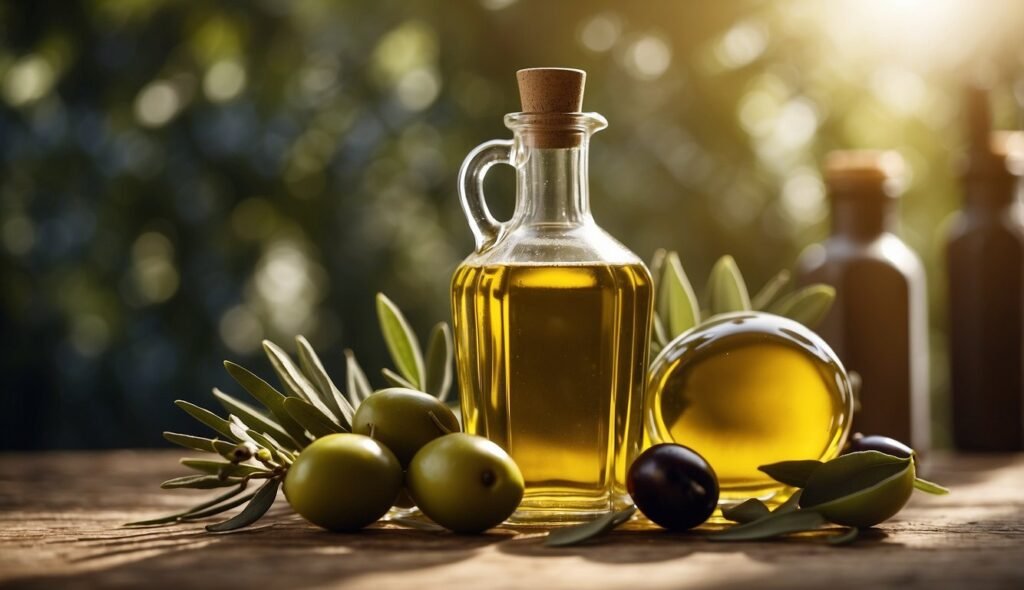Are you following a paleo diet and wondering if olive oil is allowed? The paleo diet is based on the idea of eating like our ancestors did during the Paleolithic era. This means consuming whole foods that were available to hunter-gatherers, such as meat, fish, vegetables, fruits, nuts, and seeds. But what about olive oil?
The good news is that olive oil is generally considered paleo-friendly. It is a natural, unrefined oil that is rich in healthy monounsaturated fats. In fact, many experts recommend olive oil as a healthy fat source for those following a paleo diet. However, it’s important to choose the right type of olive oil and use it in moderation.
What Is Paleo Olive Oil?
If you’re following the Paleo diet, you may be wondering if olive oil is allowed. The answer is yes! In fact, olive oil is a staple in the Paleo diet and is considered one of the healthiest fats you can consume.
Origins of Paleo Diet
The Paleo diet, also known as the caveman diet, is based on the idea that we should eat the same foods our ancestors ate during the Paleolithic era. This means consuming whole, unprocessed foods like meat, fish, vegetables, and fruit while avoiding processed foods, grains, and dairy.
Definition of Paleo Olive Oil
Paleo olive oil is simply extra-virgin olive oil that has been cold-pressed and unrefined. This means that it has not been treated with chemicals or heat, which can damage the oil and reduce its nutritional value.
Olive oil is primarily made up of monounsaturated fats, which are considered to be healthy fats. It also contains antioxidants and anti-inflammatory compounds that can help reduce the risk of chronic diseases like heart disease and cancer.
When selecting olive oil for your Paleo diet, look for extra-virgin olive oil that is cold-pressed and unrefined. This will ensure that you are getting the highest quality oil with the most health benefits.
In summary, Paleo olive oil is simply high-quality, unrefined extra-virgin olive oil that is a healthy and nutritious addition to the Paleo diet.
Benefits of Paleo Olive Oil
If you’re following the paleo diet, olive oil is a great addition to your pantry. This oil has been used for centuries and is a staple in Mediterranean cuisine. Here are some of the benefits of including olive oil in your paleo diet.
Nutritional Profile
Olive oil is rich in monounsaturated fatty acids (MUFA) and polyphenols, which are powerful antioxidants that help protect your cells from damage caused by free radicals. Additionally, olive oil is a good source of vitamins E and K. A 1 tablespoon serving of olive oil provides:
- Calories: 120
- Total fat: 14g
- Saturated fat: 2g
- Monounsaturated fat: 10g
- Polyunsaturated fat: 2g
- Vitamin E: 10% of the Daily Value (DV)
- Vitamin K: 10% of the DV
Health Advantages
Including olive oil in your paleo diet can provide numerous health benefits. Here are some of the advantages:
- Reduces inflammation: Olive oil contains oleocanthal, which has anti-inflammatory properties that can help reduce inflammation in the body.
- Promotes heart health: Studies have shown that a diet rich in olive oil can lower the risk of heart disease by reducing LDL (bad) cholesterol levels and increasing HDL (good) cholesterol levels.
- Aids digestion: Olive oil can help improve digestion by stimulating the production of bile, which is essential for breaking down fats in the small intestine.
- Supports brain health: The polyphenols in olive oil have been shown to improve cognitive function and reduce the risk of cognitive decline.
In conclusion, olive oil is a healthy and delicious addition to your paleo diet. Use it as a cooking oil or drizzle it over salads and vegetables for a flavorful boost.
Incorporating Paleo Olive Oil into Your Diet
Olive oil is a staple in the Paleo diet and can be incorporated into your daily meals in various ways. Here are some cooking tips and recipe ideas to help you make the most out of your Paleo olive oil.
Cooking Tips
When cooking with olive oil, it is important to keep in mind the smoke point, which is the temperature at which the oil begins to smoke and break down. Extra virgin olive oil has a lower smoke point than regular olive oil, so it is best used for dressings, dips, and low-heat cooking. Regular olive oil can be used for sautéing, baking, and roasting.
To maximize the health benefits of olive oil, use it as a replacement for other oils and fats in your cooking. For example, instead of using butter or margarine, use olive oil to sauté vegetables or fry eggs. You can also drizzle olive oil over roasted vegetables or grilled meats for added flavor and nutrition.
Recipe Ideas
Here are some recipe ideas to help you incorporate Paleo olive oil into your diet:
- Salad Dressing: Mix together extra virgin olive oil, balsamic vinegar, Dijon mustard, and honey for a delicious and healthy salad dressing.
- Roasted Vegetables: Toss vegetables such as sweet potatoes, carrots, and Brussels sprouts in regular olive oil, salt, and pepper, and roast in the oven for a tasty and nutritious side dish.
- Grilled Chicken: Marinate chicken breasts in a mixture of regular olive oil, lemon juice, garlic, and herbs for a flavorful and tender grilled chicken dish.
- Egg Salad: Use extra virgin olive oil instead of mayonnaise in your egg salad for a healthier and more flavorful version of this classic dish.
By incorporating Paleo olive oil into your daily meals, you can enjoy its many health benefits while adding flavor and nutrition to your diet.
Choosing the Right Paleo Olive Oil
When it comes to choosing the right olive oil for your Paleo diet, there are a few things to keep in mind. Here are some quality indicators and top brands to help you make the right choice.
Quality Indicators
First and foremost, look for extra virgin olive oil (EVOO) that is cold-pressed. This means that the oil is extracted from the olives without the use of heat or chemicals, which preserves the natural flavor and nutrients. EVOO is also the least processed form of olive oil, making it the healthiest choice.
Check the label for the harvest date and the region where the olives were grown. Freshness is key when it comes to olive oil, and you want to make sure you’re getting a high-quality product. Look for oils that are harvested within the last year and from reputable regions such as Italy, Greece, or Spain.
Another quality indicator is the color of the oil. EVOO should be a golden-green color, indicating that it is made from ripe, healthy olives. Beware of oils that are a pale yellow or clear color, as they may be overly processed or diluted with other oils.
Top Brands and Products
Some top brands of Paleo olive oil include:
- California Olive Ranch: This brand produces high-quality EVOO that is cold-pressed and made from olives grown in California. Their oils are also certified extra virgin by the California Olive Oil Council.
- Kirkland Signature: Costco’s private label brand offers a variety of EVOO options that are cold-pressed and made from olives grown in Italy, Greece, or Spain.
- Lucini: This brand offers EVOO that is cold-pressed and made from olives grown in Tuscany, Italy. Their oils are also certified extra virgin by the North American Olive Oil Association.
- O-Live & Co.: This brand produces EVOO that is cold-pressed and made from olives grown in Chile. Their oils are also certified organic and non-GMO.
When choosing a Paleo olive oil, it’s important to look for quality indicators such as cold-pressed EVOO, a recent harvest date, and a reputable region. These top brands and products can help you find a high-quality oil to add to your Paleo diet.



